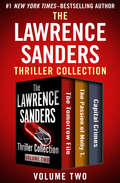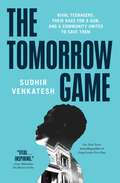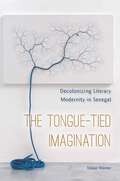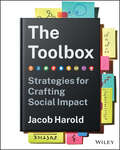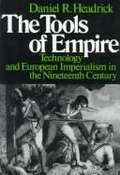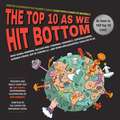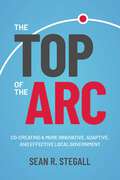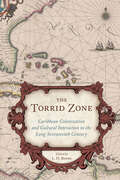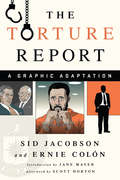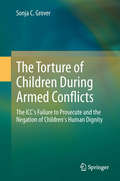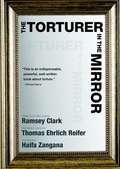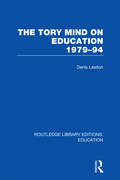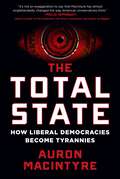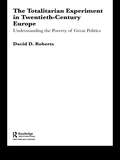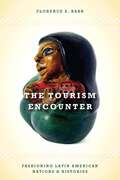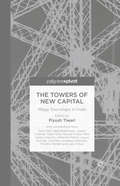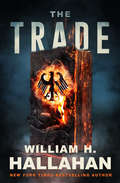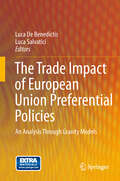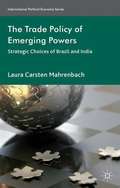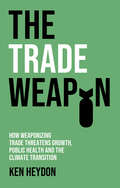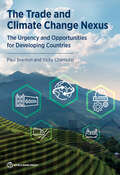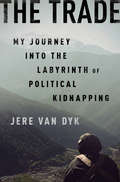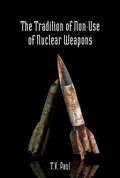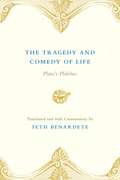- Table View
- List View
The Tomorrow File, The Passion of Molly T., and Capital Crimes: The Tomorrow File, The Passion of Molly T., and Capital Crimes
by Lawrence SandersThree gripping thrillers with settings ranging from a terrifying dystopia to a politically charged college campus, from the bestselling creator of the Edward X. Delaney Series. In the future, the government controls every aspect of its citizens' lives, from their gender and their genes to where they work, what they eat, and how they love. The Tomorrow File tells the story of what happens to utopia when people get fed up with pleasure, and stand up to fight for their right to live how they choose--and die for what they believe in. Activism runs rampant on the college campus where young Molly Turner seeks vengeance after her radical feminist girlfriend is killed by homophobic bigots. In The Passion of Molly T., there is a fine line between justice and mayhem. His name is Brother Kristos, and to the president of the United States, he is a savior, a holy man who has been able to do something no doctor could manage: heal the president's son. But as the president relies more and more on the mystic, the country slips toward chaos--and the explosive finale of Capital Crimes. These three novels from "master of suspense" Lawrence Sanders (TheWashington Post) show the world on the brink of disaster. Whether set in the distant future or the here and now, the thrillers in this three-volume omnibus will prove impossible to put down.
The Tomorrow Game: Rival Teenagers, Their Race for a Gun, and a Community United to Save Them
by Sudhir VenkateshA New York Times bestselling author&’s gripping account of a Chicago community coming together to save a group of teenagers from gun violence.In the tradition of works like Random Family and Behind the Beautiful Forevers, Sudhir Venkatesh&’s The Tomorrow Game is a deeply reported chronicle of families surviving in a Southside Chicago community. At the heart of the story are two teenagers: Marshall Mariot, an introverted video gamer and bike rider, and Frankie Paul, who leaves foster care to direct his cousin&’s drug business while he&’s in prison. Frankie devises a plan to attack Marshall and his friends—it is his best chance to showcase his toughness and win respect for his crew. Catching wind of the plan, Marshall and his friends decide they must preemptively go after Frankie&’s crew to defend their honor. The pressure mounts as both groups of teens race to find a gun and strike first. All the while, the community at large—a cast that includes the teens&’ families, black market gun dealers, local pastors, a bodega owner, and a veteran beat cop—try their best to defuse the conflict and keep the kids alive. Based on Venkatesh&’s three decades of immersion in Chicago&’s Southside, and as propulsive as a novel, The Tomorrow Game is a nuanced, timely look at the toll that poverty and gun violence take on families and their communities.
The Tongue-Tied Imagination: Decolonizing Literary Modernity in Senegal
by Tobias WarnerWinner, 2021 African Literature Association First Book AwardShould a writer work in a former colonial language or in a vernacular? The language question was one of the great, intractable problems that haunted postcolonial literatures in the twentieth century, but it has since acquired a reputation as a dead end for narrow nationalism. This book returns to the language question from a fresh perspective. Instead of asking whether language matters, The Tongue-Tied Imagination explores how the language question itself came to matter. Focusing on the case of Senegal, Warner investigates the intersection of French and Wolof. Drawing on extensive archival research and an under-studied corpus of novels, poetry, and films in both languages, as well as educational projects and popular periodicals, the book traces the emergence of a politics of language from colonization through independence to the era of neoliberal development. Warner reads the francophone works of well-known authors such as Léopold Senghor, Ousmane Sembène, Mariama Bâ, and Boubacar Boris Diop alongside the more overlooked Wolof-language works with which they are in dialogue.Refusing to see the turn to vernacular languages only as a form of nativism, The Tongue-Tied Imagination argues that the language question opens up a fundamental struggle over the nature and limits of literature itself. Warner reveals how language debates tend to pull in two directions: first, they weave vernacular traditions into the normative patterns of world literature; but second, they create space to imagine how literary culture might be configured otherwise. Drawing on these insights, Warner brilliantly rethinks the terms of world literature and charts a renewed practice of literary comparison.
The Toolbox: Strategies for Crafting Social Impact
by Jacob HaroldTransform your corner of the world with strategies from a social change visionary In The Toolbox: Strategies for Crafting Social Impact, celebrated nonprofit executive Jacob Harold delivers an expert guide to doing good in the 21st century. In the book, you'll explore nine tools that have driven world-shaking social movements and billion-dollar businesses—tools that can work just as well for a farmers market or fire department or small business. The author describes each of the tools—including storytelling, mathematical modeling, and design thinking—in a stand-alone chapter, intertwining each with a consistent narrative and full-color visual structure. Readers will also find: A consistent focus and emphasis on the work of social good and how it can be applied in any business, government agency, or nonprofit organization Dozens of poems, photos, equations, diagrams, and stories to illustrate and enrich of the core ideas of the book. A fulsome, three-chapter introduction offering an a crash course in the basics of social impact strategy in the 21st century A comprehensive strategic playbook for contributing to the shared work of building a better world An essential blueprint for anyone interested in improving the world around them, The Toolbox: Strategies for Crafting Social Impact is an incisive strategic guide that will prove to be indispensable for everyone who seeks to collaboratively build something better.
The Tools of Empire: Technology and European Imperialism in the Nineteenth Century
by Daniel R. HeadrickExcellent for global history courses because of its focus on Asia and Africa during the critical period of European imperialism.
The Top 10 As We Hit Bottom: What Global Warming, Nuclear War, Cyberwar, Pandemics, Supervolcanoes, Asteroid Strikes, Out-of-Control A.I., and Other Unpleasantries Could Do to Us.
by Jim ParryFrom best-selling author and illustrator Ron Barrett, who forecasted the weather in the classic picture book, Cloudy With a Chance of Meatballs, now predicts how—thanks to climate change and other unpleasantries—the world will end! With research and really scary text by Jim Parry, The Top Ten As We Hit Bottom is a darkly humorous collection of &“Top Ten&” lists that highlights the predicament global warming and other impending catastrophes have put us into. Though some might call these lists &“fake news&” (we&’re looking at you, Donald), these lists are compiled and culled from the world's most credible authorities like NASA, the UN, and the Union of Concerned Scientists. But coupled with darkly humorous illustrations, you&’ll be laughing your way all the way down in our race toward the bottom! Here are some Top 10 lists to whet your appetite for Earth&’s impending doom: &“Top 10 species we&’ll lose to climate change&”&“Top 10 avalanches mostly caused by global warming&”&“Top 10 climate change deniers&”&“Top 10 times we almost had a nuclear war,&”&“Top 10 things that will happen when the Yellowstone Supervolcano erupts,&”&“Top 10 ways to try to stop an asteroid,&”&“Top 10 signs that the earth is about to be swallowed by a black hole,&”&“Top 10 ways a particle accelerator mishap could destroy the world,&”&“Top 10 end-of-world cults you can join now.&”And many more!
The Top of the Arc: Cocreating a More Innovative, Adaptive, and Effective Local Government
by Sean R. StegallThe Top of the Arc focuses on how local governments and the people they serve can cocreate exceptional communities through innovation, collaboration, and adaptation. In 2016, the Town Council of Cary, North Carolina appointed change-agent Sean R. Stegall to manage the thriving community of more than 180,000 people from more than 60 countries with a national reputation for excellence — safe neighborhoods, extensive bike-friendly parks and greenways, environmental stewardship, robust business climate, and premier sports venues. With vacant land becoming scarce, the development trends that fueled Cary&’s successes over five decades would have to change, and Stegall&’s job was to &“keep Cary Cary&” while, at the same time, implementing the Imagine Cary Community Plan, a policy and strategy document years in the making that would address these trends and carry the city forward to 2040. Instilling a &“people first&” philosophy, Stegall and the elected Cary Town Council are reshaping local government through collaboration, experimentation, innovation, and adaptation. Cary remains an exceptional place to call home, an inspiring destination for visitors, and a compelling case study for helping keep cities strong.
The Torrid Zone: Caribbean Colonization and Cultural Interaction in the Long Seventeenth Century (Carolina Lowcountry and the Atlantic World)
by L. H. RoperThe first comparative history of European settlers’ trading, pirating, and colonizing activities in the Caribbean.Brimming with new perspectives and cutting-edge research, the essays collected in The TorridZone explore colonization and cultural interaction in the Caribbean from the late 1600s to the early 1800s—a period known as the “long” seventeenth century—a time when these encounters varied widely and the diverse actors were not yet fully enmeshed in the culture and power dynamics of master-slave relations. The events of this era would profoundly affect the social and political development both of the colonies that Europeans established in the Caribbean and the wider world.This book is the first to offer comparative treatments of Danish, Dutch, English, and French trading, pirating, and colonizing activities in the Caribbean and analysis of the corresponding interactions among people of African, European, and Native origin. The contributions range from an investigation of the indigenous colonization of the Lesser Antilles by the Kalinago to a look at how the Anglo-Dutch wars in Europe affected relations between the English inhabitants and the Dutch government of Suriname. Among the other essays are incisive examinations of the often-neglected history of Danish settlement in the Virgin Islands, attempts to establish French colonial authority over the pirates of Saint-Domingue, and how the Caribbean blueprint for colonization manifested itself in South Carolina through enslavement of Amerindians and the establishment of plantation agriculture.The extensive geographic, demographic, and thematic concerns of this collection shed a clear light on the socioeconomic character of the “Torrid Zone” before and during the emergence and extension of the sugar-and-slaves complex that came to define this region. The book is an invaluable contribution to our understanding of the social, political, and economic sensibilities to which the operators around the Caribbean subscribed as well as to our understanding of what they did, offering in turn a better comprehension of the consequences of their behavior.“Covering a variety of undertakings, especially English but also Dutch, Danish, French and indigenous, this collection makes a welcome contribution to our understanding of a pivotal period in the history of the West Indies.” —Carla Gardina Pestana, University of California, Los Angeles“This illuminating collection of essays brings the Caribbean squarely into the frame of analysis strongly making the case that the experiences and developments of the Caribbean colonies remained crucial to the history of colonial America. The contributions cover the centrality of enslaved people’s labor and the actions of Indigenous and peoples of African descent who shaped the history of the region through their resistance, accommodation, and engagement.” —Ignacio Gallup-Diaz, Bryn Mawr College
The Torture Report: A Graphic Adaptation
by Jane Mayer Sid Jacobson Scott Horton"The more who learn the truth the better off the country will be, because there is no better safeguard against the revival of torture than a well-informed public." --Jane Mayer, from the IntroductionOn December 9, 2014, the Senate Select Committee on Intelligence released a report that strongly condemned the CIA for its secret and brutal use of torture in the treatment of prisoners captured in the "war on terror" during the George W. Bush administration. This deeply researched and fully documented investigation caused monumental controversy, interest, and concern, and starkly highlighted both how ineffective the program was as well as the lengths to which the CIA had gone to conceal it.In The Torture Report, Sid Jacobson and Ernie Colón use their celebrated graphic-storytelling abilities to make the damning torture report accessible, finally allowing Americans to lift the veil and fully understand the crimes committed by the CIA.
The Torture of Children During Armed Conflicts
by Sonja C. GroverThis book examines selected legal complexities of the notion of torture and the issue of the proper foundation for legally characterizing certain acts as torture, especially when children are the targeted victims of torture. ICC case law is used to highlight the International Criminal Court's reluctance in practice to prosecute as a separable offence the crime of torture as set out in one or more of the relevant provisions of the Rome Statute where children are the particularized targets as part of a common plan during armed conflict. Also addressed is the failure of the ICC to consider that the young age of the victims of torture (i. e. children) should be an aggravating factor taken into account in determining the ICC sentence for those convicted of the torture of civilians, including children, in the context of armed conflict as part of a common plan. The six UN-designated grave crimes against children (including child soldiering for State or non-State forces perpetrating mass atrocities, and sexual violence perpetrated on a systematic and widespread basis against children including child soldiers), it is argued, are also instances of the torture of children as part of a common plan such that separate charges of torture are legally supportable (along with the other charges relating to additional Rome Statute offences involved in such circumstances). Useful legal perspectives on the issue of the torture of children in its various manifestations gleaned from the case law of other international judicial forums such as the Inter-American Court of Human Rights and the ICTY are also examined.
The Torturer in the Mirror
by Haifa Zangana Ramsey Clark Thomas Ehrlich ReiferBefore the US invasion of Iraq, before the American public saw the infamous photos from Abu Ghraib, the CIA went to the White House with a question: What, according to the Constitution, was the line separating interrogation from torture--and could that line be moved? The White House lawyers' answer--in the form of legal documents later known as the "Torture Memos"--became the US's justification for engaging in torture. The Torturer in the Mirror shows us how when one of us tortures, we are all implicated in the crime. In three uncompromising essays, Iraqi dissident Haifa Zangana, former US Attorney General Ramsey Clark, and professor of sociology Thomas Ehrlich Reifer teach us how physically and psychologically insidious torture is, how deep a mark it leaves on both its victims and its practitioners, and how necessary it is for us as a society to hold torturers accountable.
The Tory Mind on Education: 1979-1994 (Routledge Library Editions: Education)
by D LawtonThis book discusses conservative education policies since 1979 by referring to beliefs, values and attitudes. It relates ideology to policies and provides some background about the years before 1979 – definitions of Conservatism and descriptions of Tory beliefs and traditional Conservative views on education. The second part of the book provides a brief outline of the years between the 1944 Education Act and 1979.
The Total State: How Liberal Democracies Become Tyrannies
by Auron MacIntyreThe Total State pulls back the veil on the new American authoritarianism and why the same system of liberal democracy we say we cherish may have led us to our present state The modern United States is a nation full of censorship, lockdowns, riots, and political persecution. How did the land of the free become a surveillance state terrified of COVID and ruled by unaccountable bureaucrats? As a journalist, Auron MacIntyre witnessed firsthand the manipulation of news events, the bias of the press, and the relentless assault on truth during the Donald Trump presidency. Yet, it wasn't until the arrival of the COVID-19 pandemic in 2020 that his worldview was irrevocably shaken. The emergency measures and unchecked power wielded by authorities revealed a dark underbelly that defied the constitutional safeguards he had always believed in.The Total State delves into the core of MacIntyre's ideological crisis, exploring the erosion of individual liberties in the name of public health and the new brand of American authoritarianism that revealed itself under a state of emergency. Drawing inspiration from a diverse array of thinkers outside the mainstream, MacIntyre questions the narrative that has been ingrained in our political discourse. What if democracy doesn&’t limit government but instead helps it to expand? What if the Constitution failed to restrain power as intended?The Total State doesn't offer easy answers, but it poses essential questions about the trajectory of our nation. MacIntyre meticulously examines the forces that have shaped our current reality, urging readers to confront uncomfortable truths about the state of our democracy and individual freedom. This thought-provoking exploration is a call to action, encouraging readers to understand the roots of our present predicament and contemplate the challenging path forward.
The Totalitarian Experiment in Twentieth Century Europe: Understanding the Poverty of Great Politics
by David RobertsBy developing a long-term supranational perspective, this ambitious, multi-faceted work provides a new understanding of ‘totalitarianism’, the troubling common element linking Soviet communism, Italian fascism and German Nazism. The book’s original analysis of antecedent ideas on the subject sheds light on the common origins and practices of the regimes. Through this fresh appreciation of their initial frame of mind, Roberts demonstrates how the three political experiments yielded unprecedented collective mobilization but also a characteristic combination of radicalization, myth-making, and failure. Providing deep historical analysis, the book proves that 'totalitarianism' best characterizes the common features in the originating aspirations, the mode of action and even the outcomes of Soviet communism, Italian fascism and German Nazism. By enhancing our knowledge of what ‘totalitarianism’ was and where it came from, Roberts affords important lessons about the ongoing challenges, possibilities, and dangers of the modern political experiment.
The Tourism Encounter: Fashioning Latin American Nations and Histories
by Florence E. BabbIn recent decades, several Latin American nations have experienced political transitions that have caused a decline in tourism. In spite of--or even because of--that history, these areas are again becoming popular destinations. This work reveals that in post-conflict nations, tourism often takes up where social transformation leaves off and sometimes benefits from formerly off-limits status. Comparing cases in Cuba, Mexico, Nicaragua, and Peru, Babb shows how tourism is a major force in remaking transitional nations. While tourism touts scenic beauty and colonial charm, it also capitalizes on the desire for a brush with recent revolutionary history. In the process, selective histories are promoted and nations remade. This work presents the diverse stories of those linked to the trade and reveals how interpretations of the past and desires for the future coincide and collide in the global marketplace of tourism.
The Towers of New Capital: Mega Townships in India
by Piyush TiwariWith mega townships as the tool, this book analyses the complexity, scale and the challenges associated with the development paradigm in India from various built environment lenses. The Towers of New Capital is an enquiry into how these 'global fixes' are leading to territorial reorganization.
The Trade
by William H. Hallahan“Hallahan graduates to the Ludlum-Follett class of writers with this crackling good thriller” (Publishers Weekly). In this brilliant thriller set against the chilling background of the international arms trade, a former American intelligence agent is killed in the Paris Metro. He dies talking of the Doomsday Book. This deadly document is the inspiration for twenty years of plotting by some of the most influential elements of Germany’s arms business. It contains a sinister plan that, if unleashed, could plunge the United States, Russia, and China into a World War III. US agent Charlie Brewer and Colin Thomas, a shrewd, gritty international trader in everything from hand grenades to jet fighters, find themselves desperately dueling with the brilliant daughter of Germany’s leading intelligence officer as they slowly penetrate a shocking worldwide conspiracy. “Puts William Hallahan up above Le Carré, Deighton and Co.” —The Bookseller
The Trade Impact of European Union Preferential Policies
by Luca De Benedictis Luca SalvaticiThe book investigates the EU preferential trade policy and, in particular, the impact it had on trade flows from developing countries. It shows that the capability of the "trade as aid" model to deliver its expected benefits to these countries crucially differs between preferential schemes and sectors. The book takes an eclectic but rigorous approach to the econometric analysis by combining different specifications of the gravity model. An in-depth presentation of the gravity model is also included, providing significant insights into the distinctive features of this technique and its state-of-art implementation. The evidence produced in the book is extensively applied to the analysis of the EU preferential policies with substantial suggestions for future improvement. Additional electronic material to replicate the book's analysis (datasets and Gams and Stata 9.0 routines) can be found in the Extra Materials menu on the website of the book.
The Trade Policy of Emerging Powers
by Laura Carsten MahrenbachAs emerging powers deepen their involvement in world trade and global governance, it is crucial to explore the what and the why of their strategic choices vis-a-vis the World Trade Organization. This book does just that, examining the trade policy decisions of two emerging power states, Brazil and India, since 2001. In this timely work, Laura Carsten Mahrenbach develops a broad-based analytical framework which addresses trade policy within EP states, in their regions and on the global level. The findings underline the importance of examining domestic factors when trying to understand strategic decisions by emerging powers. They also have important implications for our understanding of the role of emerging power states in global (trade) governance.
The Trade Weapon: How Weaponizing Trade Threatens Growth, Public Health and the Climate
by Ken HeydonPrompted by geostrategic rivalry and the war in Ukraine, COVID-19 and the climate transition, trade policy is increasingly being weaponized. This trend towards protectionist capture and retaliation is self-sabotaging and bad for growth. But there is another way. In this hard-hitting book, Ken Heydon offers alternatives to the trade weapon: the need for diplomatic carrots to accompany the sanctions stick; for resilience in supply chains rather than self-sufficiency through ill-advised reshoring and friend-shoring; for multilateral WTO remedies to rule breaking rather than unilateral penalties in the name of national sovereignty; and for direct action on environment and public health goals rather than the blunt tool of trade restriction. But, to restrain the damaging subordination of trade policy to other ends, governments must address the discontents of trade and do better at helping losers, adjusting to technological change and making the case for open markets. At stake are three decades of income gains from globalization and the ability to deal effectively with the climate transition and the next pandemic.
The Trade and Climate Change Nexus: The Urgency and Opportunities for Developing Countries
by Paul Brenton Vicky ChemutaiWhile trade exacerbates climate change, it is also a central part of the solution because it has the potential to enhance mitigation and adaptation. This timely report explores the different ways in which trade and climate change intersect. Trade contributes to the emissions that cause global warming and is itself also affected by climate change through changing comparative advantages. The report also confronts several myths concerning trade and climate change. The Trade and Climate Change Nexus: The Urgency and Opportunities for Developing Countries focuses on the impacts of, and adjustments to, climate change in developing countries and on how future trade opportunities will be affected by both the changing climate and the policy responses to address it. The report discusses how trade can provide the goods and services that drive mitigation and adaptation. It also addresses how climate change creates immense challenges for developing countries, but also new opportunities to promote trade diversification in the transition to a low-carbon world. Suitable trade and environmental policies can offer effective economic incentives to attain both sustainable growth and poverty reduction.
The Trade-Security Nexus in EU External Action: A Practice Approach (Contributions to International Relations)
by Julian StueberThis book examines the interactions between trade policy and foreign and security policy in EU external action as a nexus of practices. Drawing on the rich empirical material of over 50 in-depth interviews with EU officials, members of the European Parliament and member state diplomats, the book reconstructs and analyses the distinctive institutional cultures of the Directorate-General for Trade and the European External Action Service, their policy practices and the effect on EU external action. It appeals to scholars of political science and international relations.
The Trade: My Journey into the Labyrinth of Political Kidnapping
by Jere Van Dykn 2014, Jere Van Dyk traveled to Afghanistan to try to discover the motives behind a kidnapping that had occurred six years earlier--his own. He was haunted by questions about why he was taken and why he was released, and troubled by the refusal of his friends, employer, and government employees to offer him a full account of what they knew. An experienced investigative reporter, he began a quest to interrogate the accuracy of everything he was told, including from the people he trusted most.In pursuing his kidnappers, and the stories of the intermediaries and money men, Van Dyk uncovered not just the story of his own abduction but the operation of what he calls the Trade: the business of kidnapping. Operating according to its own shadowy rules, the Trade has become a murky form of negotiation between criminal groups, corporations, families, and governments who have no formal lines of communication.Van Dyk's journey took him from up near the Tribal Areas of Pakistan, to the tea shops of Kabul, to the Obama White House, and revealed evidence of lucrative transactions and rival bandit groups working under the direction of intelligence services. In its course, he met the families of many Americans who were or are still kidnapped, bargaining chips at the mercy of violent and pitiless extremists who thrive in the world's most lawless spaces.
The Tradition of Non-Use of Nuclear Weapons
by T. V. PaulSince the Hiroshima and Nagasaki attacks, no state has unleashed nuclear weapons. What explains this? According to the author, the answer lies in a prohibition inherent in thetradition of non-use, a time-honored obligation that has been adhered to by all nuclear states-thanks to a consensus view that use would have a catastrophic impact on humankind, the environment, and the reputation of the user. The book offers an in-depth analysis of the nuclear policies of the U. S. , Russia, China, the UK, France, India, Israel, and Pakistan and assesses the contributions of these states to the rise and persistence of the tradition of nuclear non-use. It examines the influence of the tradition on the behavior of nuclear and non-nuclear states in crises and wars, and explores the tradition's implications for nuclear non-proliferation regimes, deterrence theory, and policy. And it concludes by discussing the future of the tradition in the current global security environment.
The Tragedy and Comedy of Life: Plato's Philebus
by Plato Seth Benardeten The Tragedy and Comedy of Life, Seth Benardete focuses on the idea of the good in what is widely regarded as one of Plato's most challenging and complex dialogues, the Philebus. Traditionally the Philebus is interpreted as affirming the doctrine that the good resides in thought and mind rather than in pleasure or the body. Benardete challenges this view, arguing that Socrates vindicates the life of the mind over the life of pleasure not by separating the two and advocating a strict asceticism, but by mixing pleasure and pain with mind in such a way that the philosophic life emerges as the only possible human life.
